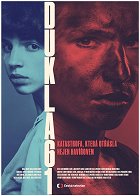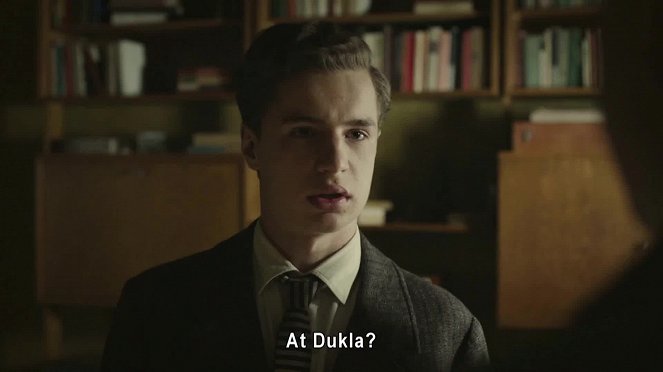Director:
David OndříčekCámara:
Marek DvořákMúsica:
Beata HlavenkováReparto:
Martha Issová, Marek Taclík, Oskar Hes, Antonie Formanová, Peter Nádasdi, Robert Mikluš, Petr Buchta, Jiří Sedláček, Štěpán Kozub, Jiří Langmajer (más)Sinopsis(1)
Two-part TV film about the biggest postwar mining disaster in Czechoslovakia: in 1961, a fire in Havířov’s Dukla Mine killed 108 miners. Against the backdrop of this tragedy, the film shows the fate of an elite miner’s family at a time when one had to fulfil the regime’s economic goals at any cost. (Finále Plzeň)
Reseñas (4)
Honest work, on many fronts. The Ondříček family line comes naturally to him because he's supported by decent actors, and the social drama fits perfectly into the cramped miner's apartment (Oskar Hes!). The mines themselves pulsate with a dark life, where darkness and minimal light prevail. Dvořák's camera perfectly corresponds with the colors and mood, which gives a hint of where everything inevitably must go. The tragedy, which leaves behind 108 lives, comes slowly and has an inappropriate effect, as if from another world. Ondříček maintains the tension by tightly controlling the pace. It's a pity that he only loosens the reins when he desires a melodramatic interlude when it's necessary to utter the last words or fall in slow motion. At the expense of the neglected wives waiting at the mine gate, I would expect more moderation in the kitsch and a more consistent approach to the smarter viewer. But even so, it's a rough masterpiece, paying homage and maintaining a silent tribute. The production process was no picnic. I know that from my (then pregnant) wife. 4 and ½.
()
It is paradoxical that a movie about miners is quite shallow and abuses all the clichés and excessive garishness of catastrophic movies. However, it does not undermine the movie, even so it is good and successful within the genre, it captures the time solidly, as well as the specificity of the mining profession. Perhaps it just didn't have to have as much family paddings and more rawness would only be beneficial. What makes it almost unwatchable, however, is the work with the dialect. If they wanted Czech actors, I´m fine with that, but I would not force them to speak unnaturally, which had to be clear on the set from the first moment. Or (which would be more logical) I will cast actors of Moravian-Silesian origin. However, the local cacophony of dialects, where each character speaks in their specific way in one scene, is a disaster. Especially when their performance is otherwise excellent. And even though Issová tries to keep the dialect, but you can tell that it is forced and not natural, Taclík speaks in his own way and only after every third and fourth sentence he remembers that he shouldn't, a completely ridiculous Langmajer (which could have been an intention, but it didn't work) and to make matters worse, the “natives" perform supporting characters. Who´s idea was is? … In any case, Dukla 61 is worth watching, that´s for sure. However, not worth hearing.
()
Sorprendentemente muy buena. El trágico suceso está filmado con sentimiento y, a pesar de la producción televisiva, con un nivel realmente alto (similar al de la reciente Metanol). David Ondříček sabe cómo hacerlo. No está exento de defectos, por supuesto. En cuanto a la trama, la película juega innecesariamente con las emociones (el protagonista tiene que tener una novia embarazada) y la crítica a la época y al régimen es quizás innecesariamente literal en algunas partes, pero no es nada abiertamente objetable. El reparto es bueno, pero no es creíble el dialecto local del checo que hablan los actores principales en la versión original. Es una pena que los realizadores hayan trabajado más y no hayan contratado a actores de Ostrava. Sin embargo, estos son detalles, la impresión general es buena y definitivamente me alegraré si la televisión pública checa (ČT) se embarca en proyectos en una línea similar.
()
I considered it my duty to watch Dukla 61, as I live a Hulk's stone’s throw away from the former mine. I was quite entertained by the first part. I managed to get over the obvious nonsense of someone just walking past the mine and, since his daddy works there, he suddenly starts working there, too. The actors obviously struggled with the typical accent of the region, and I was quite puzzled by some of the expressions. Despite these reservations, I was pleased with the first part of the film, and I definitely won't miss the second part. // What a huge disappointment. At times I felt like I was watching Cameron's Titanic. There’s no tragedy that can't be "improved" by a few action scenes. As if 108 casualties weren't enough, they had to turn it into a weird survival horror full of smoke, air hoses and murderous axes and pickaxes. I don't even want to write more about it. The first part deserves 4*-, the second one 2*- at most, so the overall result of 3*- is more than enough.
()

